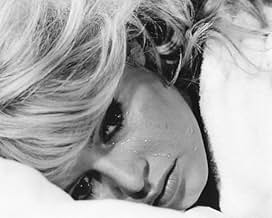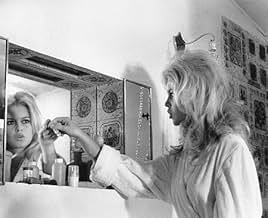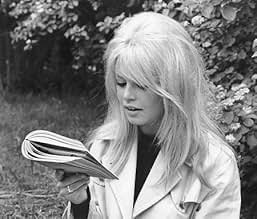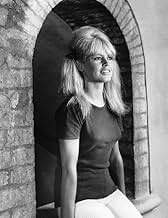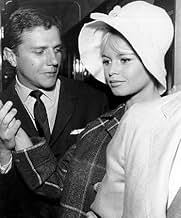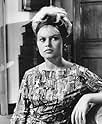VALUTAZIONE IMDb
5,6/10
1334
LA TUA VALUTAZIONE
Aggiungi una trama nella tua linguaWhen Jill becomes a movie star she soon discovers that her private life is destroyed by persistent fans that won't leave her alone. Her mother's ex-lover, Fabio, tries to protect her.When Jill becomes a movie star she soon discovers that her private life is destroyed by persistent fans that won't leave her alone. Her mother's ex-lover, Fabio, tries to protect her.When Jill becomes a movie star she soon discovers that her private life is destroyed by persistent fans that won't leave her alone. Her mother's ex-lover, Fabio, tries to protect her.
- Regia
- Sceneggiatura
- Star
Paul Sorèze
- Maxime
- (as Paul Soreze)
Eléonore Hirt
- Cécile
- (as Eleonore Hirt)
Jeanne Allard
- La femme de ménage
- (non citato nei titoli originali)
Paul Apoteker
- Le caméraman
- (non citato nei titoli originali)
Jean-Claude Brialy
- Le narrateur
- (voce)
- (non citato nei titoli originali)
Claude Day
- L'éditeur
- (non citato nei titoli originali)
Christian de Tillière
- Albert
- (non citato nei titoli originali)
Recensioni in evidenza
It was the dubbed version that I saw of this dreary little story about an actress (BB) who finds out, as is almost always the way, that her internal happiness is a sacrificial lamb to fame. Certainly good-looking - with La Bardot at her most luscious how could it not be? - but never very compelling.
The ending is, however, notable for going waaaaaay over the top. (Has anyone noticed how many Brigitte Bardot movies have unhappy endings?)
The ending is, however, notable for going waaaaaay over the top. (Has anyone noticed how many Brigitte Bardot movies have unhappy endings?)
One would have thought that Mastrioanni and Bardot would make 'beautiful music together'. However, this is mostly a self-indulgent treatment that could be part of the problem. Bardot's narcissistic behavior was either excellent acting or her real-life behavior.
I loved this movie for the beautiful scenes of Geneva and Spoleto, Italy. I've never seen how they do these wonderful operatic festivals and I really liked it. Georgeous technicolor. However, I could not find this movie reviewed in any of my review books: perhaps it's known by another name.
It is never clear what illness Bardot has in this movie....could have been a nervous breakdown, could have been flu, who knows? If you like looking at beautiful people, and georgous scenery, rent it. Otherwise, don't waste your time.
I loved this movie for the beautiful scenes of Geneva and Spoleto, Italy. I've never seen how they do these wonderful operatic festivals and I really liked it. Georgeous technicolor. However, I could not find this movie reviewed in any of my review books: perhaps it's known by another name.
It is never clear what illness Bardot has in this movie....could have been a nervous breakdown, could have been flu, who knows? If you like looking at beautiful people, and georgous scenery, rent it. Otherwise, don't waste your time.
In 1961,BB was the biggest star France had ever had.Never in the history of French cinema an actress had crystallized around her such an adulation..but also so much hatred.One scene sums up everything;in an elevator ,Jill (BB) meets a cleaning lady who insults her,calls her whore and tells her that while she is playing around,her brother is fighting in Algeria.This woman of the people epitomizes what a lot of common men used to think circa 1960.Like in Clouzot's "la vérité" ,as an user wrote,the people is judging Bardot.
"Vie privée" is looked upon as one of Louis Malle's weakest efforts and it's probably unfair.He did much worse later ("le souffle au coeur"(1971).Its hints at Bardot's own life seem dated now but they inspire its vital extremism:Jill (BB) becomes a big star and it's a hellish life which begins.The scene when Jill is tracked down in her own house by journalists is barely fiction:in her memoirs,BB tells that German tourists' tour in Saint-Tropez included her house's visit!!The movie has two parts;the first one is the rise of the star and her efforts to escape from the maddening crowd:Louis Malle uses too much voice over,and a telegraphic style,très nouvelle vague.The second part depicts her relationship with a handsome Italian (Mastroianni),but even in a foreign country she's got to hide in a bedroom.The movie turns a bit pretentious ,with pompous music -from an opera Mastroianni is directing-;and after the rise,comes the fall (in every sense of the term).
BB was never a bimbo (une ravissante idiote) but a clever sensitive woman.We feel it in Malle's work.Watch it for her.
"Vie privée" is looked upon as one of Louis Malle's weakest efforts and it's probably unfair.He did much worse later ("le souffle au coeur"(1971).Its hints at Bardot's own life seem dated now but they inspire its vital extremism:Jill (BB) becomes a big star and it's a hellish life which begins.The scene when Jill is tracked down in her own house by journalists is barely fiction:in her memoirs,BB tells that German tourists' tour in Saint-Tropez included her house's visit!!The movie has two parts;the first one is the rise of the star and her efforts to escape from the maddening crowd:Louis Malle uses too much voice over,and a telegraphic style,très nouvelle vague.The second part depicts her relationship with a handsome Italian (Mastroianni),but even in a foreign country she's got to hide in a bedroom.The movie turns a bit pretentious ,with pompous music -from an opera Mastroianni is directing-;and after the rise,comes the fall (in every sense of the term).
BB was never a bimbo (une ravissante idiote) but a clever sensitive woman.We feel it in Malle's work.Watch it for her.
Reviewers have suggested that this is not among the best of Malle's output and that the two principals lack the fire of real heterosexual passion.
The second objection is perfectly right, because Jill seems incapable of a grown-up relationship with a man, just as she seems incapable of pursuing any worthwhile career beyond that of international sex-symbol. Being highly desirable and readily available may be huge fun in your teens and early twenties but does not lead to a fulfilling existence. Her trajectory is tragic, beauty that offers not life but a hollow illusion of life.
While Fabio cannot resist what he finds in his bed (few straight men could), his feelings for Jill seem more pity than lust. He wants to protect her from endless exploitation by others and from her own immaturity. But, having gained an international reputation for the magazine he edits and the play he is producing, he is not going to sacrifice his hard-won status for a bimbo. He is creative, adding to the world's culture, while she is merely decorative.
A relationship between two characters like this will be short of fire, and it would be Hollywoodian falsity to pretend that they are merely consumed with passion for each other.
As for the place of this piece in Malle's very varied body of work, his non-documentary dramas differ widely from each other with few overt links. Here one has to consider his own evolution: an artist's fourth picture made at age 30 does not compare with a mature and reflective masterpiece like "Au revoir les enfants" made at age 55. Films appreciated in Europe can be lost in America, particularly if mutilated by tone-deaf dubbing and puritanical cutting. Also, I would suggest, we might separate films set in the past or an imaginary future from films set in and therefore commenting on the present.
To show the real superstar Brigitte Bardot as a fictional empty superstar, virtually playing herself (compared with her more nuanced rôle for Godard a year later in "Le Mépris"), is satirical, poignant, and even, dare I say it, darkly comic. If you don't get the joke, though many would have in 1962, you may not rate the film highly.
The second objection is perfectly right, because Jill seems incapable of a grown-up relationship with a man, just as she seems incapable of pursuing any worthwhile career beyond that of international sex-symbol. Being highly desirable and readily available may be huge fun in your teens and early twenties but does not lead to a fulfilling existence. Her trajectory is tragic, beauty that offers not life but a hollow illusion of life.
While Fabio cannot resist what he finds in his bed (few straight men could), his feelings for Jill seem more pity than lust. He wants to protect her from endless exploitation by others and from her own immaturity. But, having gained an international reputation for the magazine he edits and the play he is producing, he is not going to sacrifice his hard-won status for a bimbo. He is creative, adding to the world's culture, while she is merely decorative.
A relationship between two characters like this will be short of fire, and it would be Hollywoodian falsity to pretend that they are merely consumed with passion for each other.
As for the place of this piece in Malle's very varied body of work, his non-documentary dramas differ widely from each other with few overt links. Here one has to consider his own evolution: an artist's fourth picture made at age 30 does not compare with a mature and reflective masterpiece like "Au revoir les enfants" made at age 55. Films appreciated in Europe can be lost in America, particularly if mutilated by tone-deaf dubbing and puritanical cutting. Also, I would suggest, we might separate films set in the past or an imaginary future from films set in and therefore commenting on the present.
To show the real superstar Brigitte Bardot as a fictional empty superstar, virtually playing herself (compared with her more nuanced rôle for Godard a year later in "Le Mépris"), is satirical, poignant, and even, dare I say it, darkly comic. If you don't get the joke, though many would have in 1962, you may not rate the film highly.
For the record, I saw the dubbed version. But for the first hour, there is so little dialogue, I don't think it could matter very much. This early Malle film spends so much time on Bardot's character's angst and yearning for her own time and space that you might be tempted to turn it off. Don't, but if you have it on tape, you may wish to fast forward. The second third of the movie is a never-ending cliche. As a reward, the ending is rich, vibrant, and celebratory.
Lo sapevi?
- QuizFrench actor Michel Auclair dubs Marcello Mastroianni's voice in French.
- ConnessioniFeatured in Censura: Alguns Cortes (1999)
- Colonne sonoreSidonie
Music by Jean-Max Rivière and Giannis Spanos
Lyrics by Charles Cros
Performed by Brigitte Bardot
I più visti
Accedi per valutare e creare un elenco di titoli salvati per ottenere consigli personalizzati
- How long is A Very Private Affair?Powered by Alexa
Dettagli
- Tempo di esecuzione1 ora 43 minuti
- Proporzioni
- 1.85 : 1
Contribuisci a questa pagina
Suggerisci una modifica o aggiungi i contenuti mancanti

Divario superiore
By what name was Vita privata (1962) officially released in Canada in English?
Rispondi

